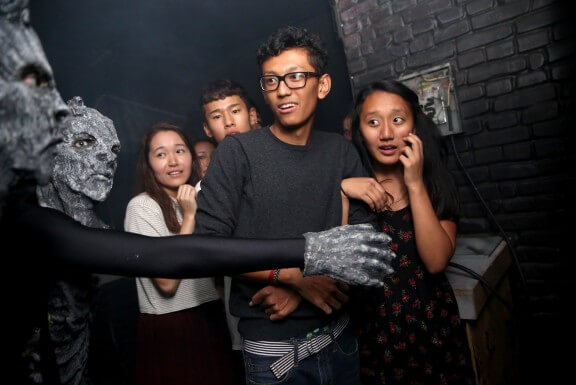 Harrison Ford (right) tries to mold Asa Butterfield into a warrior in “Ender’s Game.”
Harrison Ford (right) tries to mold Asa Butterfield into a warrior in “Ender’s Game.”
Credit: Richard Foreman, Jr.
‘Ender’s Game’
Director: Gavin Hood
Stars: Asa Butterfield, Harrison Ford
Rating: PG-13
3 (out of 5) Globes
For what it’s worth, “Ender’s Game” doesn’t seem like the work of a homophobic warmonger. Orson Scott Card has spent much of his life railing against homosexuality, and went gung ho for the Iraq War. But his most celebrated sci-fi novel is the work of someone if not anti-war then war-skeptic. Set during a “Starship Troopers”-esque future, when mankind tussles with belligerent bug-like aliens, it asks hard questions about how inhuman military leaders must be to succeed while wondering about war’s effectiveness. A movie adaptation would have been even more relevant while its creator was voting Bush II to a second term.
Now it’s a mere franchise-launcher, if an atypically smart one. Because it’s already horrific enough to imagine 6-year-olds training for war, as in the book, our titular hero winds up being played by 16-year-old Asa Butterfield (“Hugo”), who still looks about 12. Ender is a robotically calm brainiac, only with a creepy psychotic streak. This quality is noticed by the gruff Graff (Harrison Ford), a colonel who thinks he’s that overused sci-fi/fanasty concept, “the one,” who can be trained to lead forces against humanity’s foe.
The film adaptation streamlines and simplifies the novel. But it’s still smart, and the simplification actually makes it a bit more effective. Where the book periodically wanders away outside of the bubble that is Ender’s training, the movie stays deep inside it. Ender gets friends, but no close ones, and even what seems like a requisite love interest (“True Grit”’s Hailee Steinfeld) winds up strictly platonic. Though much of it plays as straight warrior-molding, with Ender’s fascist tendencies emboldened and exploited, both book and film have something sly up their sleeves.Like him, we never see the world he’s defending, or the enemy he’s being trained to obliterate. War remains abstract.
Director Gavin Hood — who went from the silly South African indie “Tsotsi” to the wretched, over-CGI’d first “Wolverine” solo film — doesn’t have the chops to give this much visual imagination. He steals the sleek, muted palettes and pounding-empowering score from “Tron Legacy” while whiffing the big character moments. And yet there’s a tight focus and a drive that’s refreshing in our ADD-addled IMAX blockbuster landscape while it nicely mirrors its antihero’s own predicament. He has blinders on, unaware he’s being grossly manipulated until the shocking revelatory twist reveals it’s too late.

















